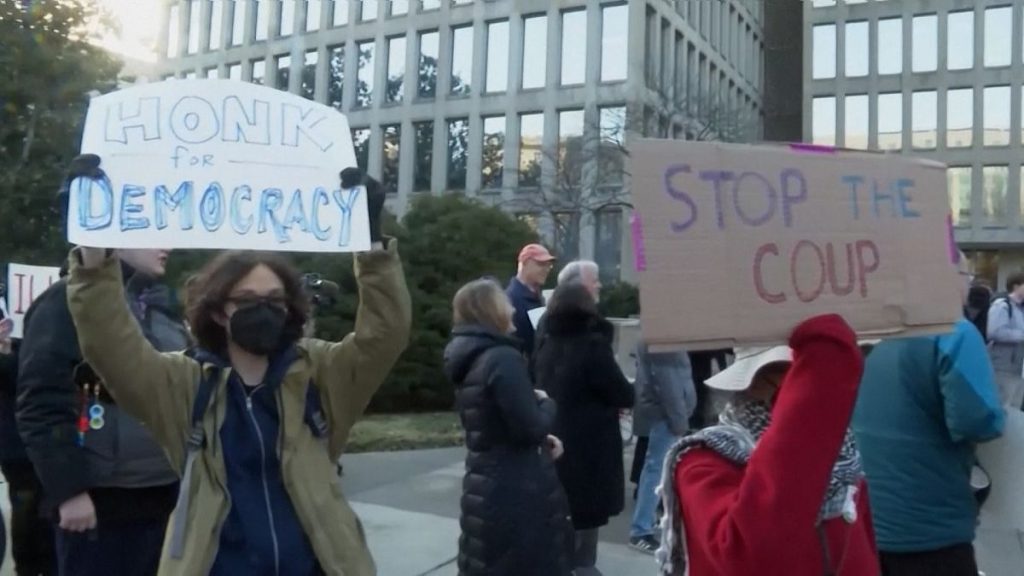The burgeoning controversy surrounding Elon Musk’s involvement in governmental affairs reached a fever pitch on Tuesday as protesters assembled outside the U.S. Office of Personnel Management (OPM) to decry what they perceive as a dangerous erosion of democratic principles and a targeted assault on the integrity of federal institutions. The demonstration underscored the growing unease among citizens and federal employees alike regarding Musk’s expanding influence and the perceived lack of oversight governing his actions. Dan Smith, a Maryland resident whose family history is intertwined with public service through his father’s career as a federal worker, articulated the protesters’ anxieties, framing Musk’s actions not as mere downsizing but as a calculated dismantling of the government itself. This sentiment, echoed by many present, painted a picture of a federal workforce under siege, facing an existential threat from an unelected individual wielding unprecedented power. The protest served as a stark reminder of the simmering tensions surrounding the role of private individuals in public governance and the potential for such arrangements to undermine established democratic norms.
Adding another layer of complexity to the unfolding narrative, the protests also highlighted a resurgence of racial anxieties within the federal workforce. Dante O’Hara, a Black federal employee, voiced deep-seated concerns about the perceived dismantling of diversity and inclusion initiatives, drawing a chilling parallel to the era of Jim Crow laws. O’Hara’s powerful invocation of this historical period, marked by systemic racial segregation and the disenfranchisement of African Americans, underscored the gravity of the situation for many minority employees. The concern is that Musk’s actions, whether intentional or not, are creating a hostile environment that threatens to reverse decades of progress in creating a more inclusive and representative federal workforce. This emerging narrative of racial regression adds a significant dimension to the broader critique of Musk’s influence, raising questions about the potential for his actions to exacerbate existing societal inequalities.
Fueling the flames of controversy is Musk’s unique designation as a “special government employee,” a status that affords him exemption from standard ethical guidelines and disclosure requirements typically binding on federal officials. This exception has drawn sharp criticism, particularly from Democrats, who express alarm over the potential for unchecked power and the increased risk of legal violations. The lack of transparency surrounding Musk’s activities raises fundamental questions about accountability and the potential for conflicts of interest. Critics argue that this opaque arrangement not only undermines the principles of democratic governance but also jeopardizes the integrity of federal institutions by creating a two-tiered system where certain individuals operate outside the established rules and regulations. This perceived double standard further erodes public trust and fuels the concerns voiced by protesters outside the OPM.
The core of the controversy revolves around Musk’s sweeping actions, undertaken without congressional approval, that have dramatically reshaped the landscape of federal agencies. His sidelining of career officials, access to sensitive databases, and the abrupt closure of the U.S. Agency for International Development (USAID) have sent shockwaves through the federal workforce and beyond. These actions, unprecedented in their scope and speed, have raised serious concerns about the rule of law and the delicate balance of power between the executive branch and the legislative branch. Critics argue that Musk’s actions represent a dangerous circumvention of established democratic processes, potentially setting a precedent for future private sector interventions in government operations without proper oversight or accountability.
The closure of USAID, a key agency responsible for administering civilian foreign aid, has drawn particularly strong condemnation. This drastic measure, implemented without congressional debate or approval, has raised concerns about the future of U.S. foreign policy and the potential for a vacuum in critical humanitarian assistance programs. The sudden termination of USAID’s operations not only disrupts ongoing projects but also sends a confusing message to international partners about America’s commitment to global development and humanitarian aid. This abrupt shift in policy, orchestrated by an individual without formal governmental authority, further underscores the anxieties surrounding Musk’s influence and the potential for his actions to have far-reaching and unintended consequences.
The protests outside the OPM represent a growing chorus of voices expressing deep unease about Elon Musk’s expanding role within the federal government. The anxieties revolve around several key issues: the perceived dismantling of the federal workforce, the resurgence of racial tensions within government agencies, the lack of transparency and accountability surrounding Musk’s actions, and the potential for his unprecedented power to erode democratic norms and undermine the integrity of federal institutions. The closure of USAID serves as a stark illustration of the potential consequences of unchecked private influence in public governance, raising fundamental questions about the future of U.S. foreign policy and the delicate balance of power within the American democratic system. The protests signify a critical juncture in the ongoing debate surrounding the role of private individuals in government affairs and the urgent need for greater transparency and accountability to ensure the preservation of democratic principles and the integrity of federal institutions.














